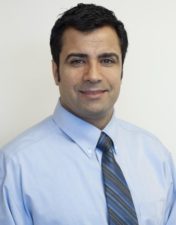Starting a Promising Firm Didn’t Insulate this Iranian Scientist from Visa Worries
Date: June 7, 2016
In 2004, Mehdi Yazdanpanah triggered a chemical reaction in a University of Louisville lab that, to his surprise, created tiny, metallic points. Intrigued, he devised a way to form individual needles – microscopic in size, yet conductive and strong, a unique combination that could advance cancer and other microscopic research. “I think,” he told his advisor, “there is a potential here.”
Then he thought: “How stupid am I? I am a foreigner. I don’t know the system. I don’t have money. ”

Yazdanpanah was raised in Sarbisheh, a town of 3,500 in Eastern Iran. His father, a grocer, extolled the value of education and Yazdanpanah received the best his country had to offer, including bachelor’s and master’s degrees in physics. But Yazdanpanah knew the best PhD opportunities were in America.
Days before his scheduled interview in Turkey for an American visa, in 2001, his brother called. “Turn on the TV,” he said. It was September 11th. Five days later, the visa officer “rejected everybody except me and my wife,” Yazdanpanah says. They entered on an F1 student visa.
Mehdi wishes the government would automatically grant green cards to PhDs so that researchers could concentrate on potentially promising work without the “nerve-breaking” fear of deportation.
The couple didn’t plan to stay, “but we found the country very welcoming,” says Yazdanpanah. And they were lucky. Many students must leave the country when their studies are complete, but a university fellowship secured him an H-1B visa for high-skilled professionals. Yazdanpanah is just glad he was here when he realized the potential of his invention in that university lab.
“It’s almost impossible to start a business outside the United States unless you have a rich father, basically, to give you the money,” he says. “It was a no-brainer that here would be a good place to start a business.”
Yazdanpanah received start-up funding from a state economic development program; won nearly $2 million in federal and state grants, including from the National Institutes of Health, the National Science Foundation and the Small Business Administration; and rounded up angel investments and private cash awards.
The money allowed him to buy equipment. NaugaNeedles, founded in 2007, fabricates nano-needles, tiny rods about 1/1000 the thickness of a human hair that can scan, image and penetrate surfaces at an atomic scale. The patented technology is used by hundreds of research groups globally in industries ranging from semi-conductors to medicine. In one of many biomedical applications, a needle can extract DNA from a single cancer cell.
NaugaNeedles variously employs between five and 12 people, plus contractors: half are American-born. More than 60 percent of its $700,000 in annual average sales are made abroad.
“I’m always saying, exporting is the most important,” Yazdanpanah says. “When you sell outside the country you’re bringing money into the country.”
He and his wife became U.S. citizens in 2013. “The United States is one of the best countries for immigration,” says Yazdanpanah. One wish, though: if the government automatically granted green cards to PhDs, then researchers could concentrate on potentially promising work without the “nerve-breaking” fear of deportation.
“It’s always, ‘What if, what if?” he says. “Every day you wake up and wonder if your visa is going to expire.”
